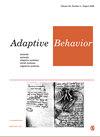Evolution of coordination in pairwise and multi-player interactions via prior commitments
IF 1.3
4区 计算机科学
Q4 COMPUTER SCIENCE, ARTIFICIAL INTELLIGENCE
引用次数: 10
Abstract
Upon starting a collective endeavour, it is important to understand your partners’ preferences and how strongly they commit to a common goal. Establishing a prior commitment or agreement in terms of posterior benefits and consequences from those engaging in it provides an important mechanism for securing cooperation. Resorting to methods from Evolutionary Game Theory (EGT), here we analyse how prior commitments can also be adopted as a tool for enhancing coordination when its outcomes exhibit an asymmetric payoff structure, in both pairwise and multi-party interactions. Arguably, coordination is more complex to achieve than cooperation since there might be several desirable collective outcomes in a coordination problem (compared to mutual cooperation, the only desirable collective outcome in cooperation dilemmas). Our analysis, both analytically and via numerical simulations, shows that whether prior commitment would be a viable evolutionary mechanism for enhancing coordination and the overall population social welfare strongly depends on the collective benefit and severity of competition, and more importantly, how asymmetric benefits are resolved in a commitment deal. Moreover, in multi-party interactions, prior commitments prove to be crucial when a high level of group diversity is required for optimal coordination. The results are robust for different selection intensities. Overall, our analysis provides new insights into the complexity and beauty of behavioural evolution driven by humans’ capacity for commitment, as well as for the design of self-organised and distributed multi-agent systems for ensuring coordination among autonomous agents.基于先前承诺的两两和多人互动中的协调演化
在开始共同努力时,重要的是要了解你的伴侣的偏好,以及他们对共同目标的承诺有多强烈。根据参与者的后向利益和后果建立事先承诺或协议,为确保合作提供了重要机制。借助进化博弈论(EGT)的方法,我们分析了在两两和多方互动中,当其结果表现出不对称的回报结构时,如何将先验承诺作为加强协调的工具。可以说,协调比合作更复杂,因为在协调问题中可能有几个可取的集体结果(与相互合作相比,合作困境中唯一可取的集体结果)。通过分析和数值模拟,我们的分析表明,在很大程度上,事先承诺是否是一种增强协调和整体人口社会福利的可行进化机制,取决于集体利益和竞争的严重程度,更重要的是,不对称利益如何在承诺交易中得到解决。此外,在多方互动中,当需要高度的群体多样性以实现最佳协调时,事先的承诺证明是至关重要的。结果对不同的选择强度具有鲁棒性。总的来说,我们的分析为人类承诺能力驱动的行为进化的复杂性和美丽提供了新的见解,也为自组织和分布式多智能体系统的设计提供了新的见解,以确保自主智能体之间的协调。
本文章由计算机程序翻译,如有差异,请以英文原文为准。
求助全文
约1分钟内获得全文
求助全文
来源期刊

Adaptive Behavior
工程技术-计算机:人工智能
CiteScore
4.30
自引率
18.80%
发文量
34
审稿时长
>12 weeks
期刊介绍:
_Adaptive Behavior_ publishes articles on adaptive behaviour in living organisms and autonomous artificial systems. The official journal of the _International Society of Adaptive Behavior_, _Adaptive Behavior_, addresses topics such as perception and motor control, embodied cognition, learning and evolution, neural mechanisms, artificial intelligence, behavioral sequences, motivation and emotion, characterization of environments, decision making, collective and social behavior, navigation, foraging, communication and signalling.
Print ISSN: 1059-7123
 求助内容:
求助内容: 应助结果提醒方式:
应助结果提醒方式:


